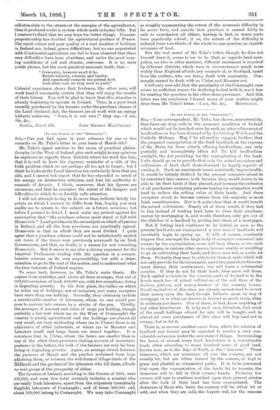rTO THE EDITOR OF THE "SPECTATOR."]
Sig,—Can you find space in your columns for one or two remarks on Mr. Tuke's letter in your issue of March 6th P Mr. Tuke's signal services to the cause of practical philan- throphy in the West of Ireland give such weight to any opinions he expresses as regards those districts where his work has lain, that it is well to have his vigorous reminder of a side of the Irish problem which we are perhaps all too apt to forget ; but I think he looks at the Land Question too exclusively from that one side, and I cannot but regret that he has expended so much of his energy on destructive criticism, and lent his authority to counsels of despair. I think, moreover, that his figures are erroneous, and that he overrates the extent of the dangers and difficulties to which he so forcibly calls attention.
I will not attempt to-day to do more than indicate briefly the points on which I venture to differ from him, hoping you may enable me to return to the subject on a future occasion ; but before I proceed to detail, I must enter my protest against his assumption that "the purchase scheme must stand or fall with Home-rule." Land purchase is the one subject on which all parties in Ireland, and all the four provinces, are practically agreed. Home-rule is that on which they are most divided. I quite agree that a purchase scheme could not be satisfactorily carried out (even if the terms were previously arranged) by an Irish Government, and that, no doubt, is a reason for not conceding Home-rule. But it seems to me also a strong argument for the Imperial Parliament dealing with the question in a compre- hensive manner on its own responsibility, but with a deter- mination to go to the root of the matter, and to understand what the true interests of Ireland require.
To come back, however, to Mr. Take's main thesis. He argues from statistics, and above all from averages, that out of 600;000 occupiers of land, 400,000 are, .with few exceptions, living in degrading poverty. In the first place, the tables on which he relies are of holdings, not of occupiers, and many occupiers have more than one holding. Secondly, they obviously include _a considerable number of labourers, whom no one would pro- pose to convert into owners by a stroke of the pen. Thirdly, the averages of amount and value of crops per holding, though probably a fair test where (as in the West of Connaught) the -country is purely agricultural and the holdings are almost all very small, are very misleading where (as in Ulster) there is an admixture of other industries, or where (as in Munster and Leinster) small and large farms are mixed together. It is notorious that in Ulster, where the farms are smaller than in any of the other three provinces (taking account of mountain. pastures in the latter), the bulk of the farmers are very far from living in degrading poverty. Again, an average struck between the pastures of Meath and the patches reclaimed from bogs adjoining them, or between the well-formed tillage-lands of the Midlands and the gardens of the labourers who till them, affords no real gauge of the prosperity of either.
The farmers of Ireland, according to the Census of 1881, were 441,928, and even this total certainly includes a number who are really Irish labourers, apart from the migratory (practically English) labourers of Connaught ; and of these 400,000 odd, about 100,000 belong to Connaught. We may take Connaught
as roughly representing the extent of the economic difficulty in its acute form, and outside that province it cannot fairly be said to overshadow all others, having; in fact, in many parts been practically solved ; if so, the extent of the difficulty is reduced from two-thirds of the whole to one-quarter, as regards occupiers of land.
But the real moral of Mr. Tuke's letter, though he does not himself draw it, seems to me to be that, as regards land occu- pation (as also in other matters), different treatment is required by different districts, which vary in circumstances much more- widely than England affords any example of, or Scotland, apart from the crofters, who are being dealt with separately. Con- naught cannot be dealt with as Ulster and Munster are.
I will only now add that the peculiarity of the Connaught case seems no sufficient reason for declining to deal with it, much less for evading the question in the other three provinces. And this latter was the conclusion I feared many of your readers might draw from Mr. Tuke's letter.—I am, Sir, &c., MONTEAGLE.






































 Previous page
Previous page